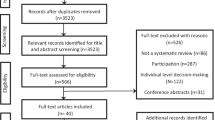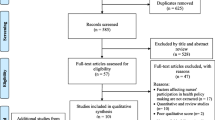Abstract
This mixed method study examined practitioners as they adopted four evidence-based practices (EBPs) in a community mental health center. In-depth semi-structured interviews; a measure of EBPs attitudes; and a final focus-group were used over a 2-year study period to assess 14 mental health practitioners on one immersion team. The framework for data collection was adapted from organizational theories that view culture and climate as mediating factors. Analysis of practitioner themes demonstrated that there were facilitating and impeding factors in the adoption process. Practitioners reported positive changes in their individual competency but two years was inadequate for training on four EBPs. Involvement of agency administration and consistent supervision were regarded by practitioners as crucial to successful adoption of EBPs.
Similar content being viewed by others
References
Aarons, G. A. (2004). Mental health provider attitudes toward the adoption of evidence-based practice: The Evidence-Based Practice Attitude Scale (EBPAS). Mental Health Services Research, 6, 61–74.
Aarons, G. A., & Sawitzky, A. C. (2006). Organizational culture and climate and mental health provider attitudes toward evidence-based practice. Psychological Services, 3(1), 61–72.
APA/CAPP Task Force on Serious Mental Illness and Severe Emotional Disturbance. Available at: www.apa.org/practice/grid.html. Accessed 1 July 2007.
Blakely, T. J., & Dziadosz, G. M. (2007). Creating an agency integrated treatment program for co-occurring disorders. American Journal of Psychiatric Rehabilitation, 10(1), 1–18.
Brekke, J., Ell, K., & Palinkas, L. A. (2007). Translational science at the National Institute of Mental Health: Can social work take its rightful place? Research on Social Work Practice, 17, 123–133.
Charmaz, K. (2006). Constructing grounded theory: A practical guide through qualitative analysis. Thousand Oaks, CA: Sage Publications.
Corrigan, P. W., Steiner, L., McCracken, S. G., Blaser, B., & Barr, M. (2001). Strategies for disseminating evidence-based practices to staff who treat people with serious mental illness. Psychiatric Services, 52, 1598–1606.
Davidson, L., O’Connell, M., Tondora, J., Styron, T., & Kangas, K. (2006). The ten top concerns about recovery encountered in mental health system transformation. Psychiatric Services, 57(5), 640–645.
Drake, R. E., Goldman, H. H., Leff, H. S., Lehman, L., Mueser, K. T., & Torrey, W. C. (2001). Implementing evidence-based practices in routine mental health service settings. Psychiatric Services, 52(2), 179–182.
Farkas, M., Gagne, C., Anthony, W., & Chamberlain, J. (2005). Implementing recovery oriented evidence based programs: Identifying critical dimensions. Community Mental Health Journal, 41(2), 141–158.
Gioia, D. (2007). Using an organizational change model to qualitatively understand practitioner adoption of evidence-based practice in community mental health. Best Practices in Mental Health: An International Journal, 2(1), 1–18.
Glisson, C., & Green, P. (2006). The effects of organizational culture and climate on the access to mental health care in child welfare and juvenile justice systems. Administration and Policy in Mental Health and Mental Health Services Research, 33(4), 433–448.
Glisson, C., & James, L. R. (2002). The cross-level effects of culture and climate in human service teams. Journal of Organizational Behavior, 23(6), 767–794.
Gonzales, J. J., Ringeisen, H. L., & Chambers, D. A. (2002). The tangled and thorny path of science to practice: Tensions in interpreting and applying evidence. Clinical Psychology: Science and Practice, 9(2), 204–209.
Institute of Medicine. (2001). Crossing the quality chasm: A new health system for the 21st century. Washington, D.C.: National Academy Press.
McHugo, G. J., Drake, R. E., Whitley, R., Bond, G. R., Campbell, K., Rapp, C. A., Goldman, H. H., Lutz, W. J., & Finnerty, M. T. (2007). Fidelity outcomes in the National Evidence-Based practices project. Psychiatric Services, 58(10), 1279–1284.
Mullen, E. J., Schlonsky, A., Bledsoe, S. E., & Bellamy, J. L. (2005). From concept to implementation: Challenges facing evidence-based social work. Evidence & Policy, 1, 61–84.
New York State Office of Mental Health Service Evidence-based Practice Statement. Available at: http://www.omh.state.ny.us/omhweb/ebp/.
Padgett, D. K. (1998). Qualitative methods in social work. Thousand Oaks: Sage Publications.
President’s New Freedom Commission on Mental Health. (2003). Achieving the promise: Transforming mental health care in America. Final Report.
Proctor, E. K. (2004). Leverage points for the implementation of evidence-based practice. Brief Treatment and Crisis Intervention, 4(3), 227–242.
Repper, J., & Perkins, R. (2003). Social inclusion and recovery: A model for mental health practice. Elsevier Health Sciences.
Schon, D. (1983). The reflective practitioner: How professions think in action. London: Maraca.
Senge, P. (2006). The fifth discipline: The art and practice of the learning organization (2nd ed.). New York: Doubleday.
Tropman, J. E. (1998). The management of ideas in the creating organization. Westport, CT: Quorum Books.
Author information
Authors and Affiliations
Corresponding author
Rights and permissions
About this article
Cite this article
Gioia, D., Dziadosz, G. Adoption of Evidence-Based Practices in Community Mental Health: A Mixed-Method Study of Practitioner Experience. Community Ment Health J 44, 347–357 (2008). https://doi.org/10.1007/s10597-008-9136-9
Received:
Accepted:
Published:
Issue Date:
DOI: https://doi.org/10.1007/s10597-008-9136-9




